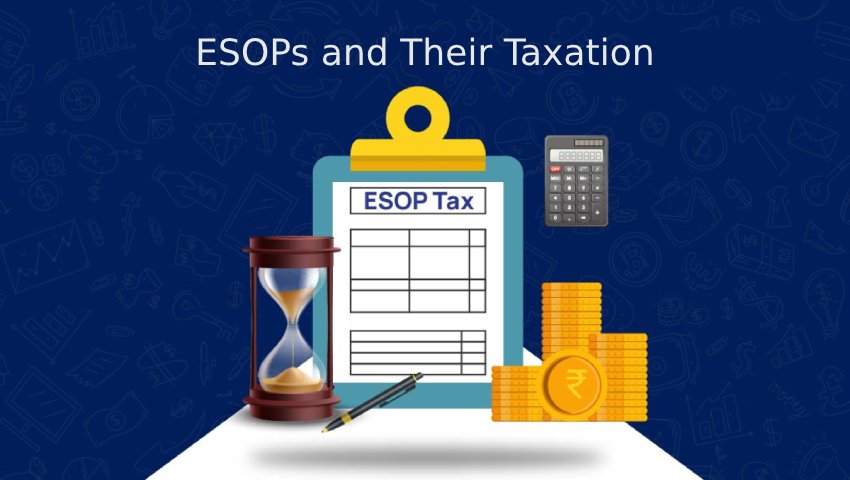
- 22/04/2025
- MyFinanceGyan
- 67 Views
- 2 Likes
- Finance, Investment, Tax
ESOPs and Their Taxation – Explained Simply
As startups and companies grow in India, many of them offer stock-based rewards to their employees. These are given to keep employees motivated and loyal. One of the most popular rewards is ESOPs (Employee Stock Option Plans), but there are many others too, like RSUs, Phantom Stocks, and Stock Appreciation Rights.
Some Indian employees working in global companies also receive shares of their parent company as part of their salary package.
In this blog, let’s break down these stock-related rewards and understand how they are taxed in India.
Common Stock-Based Compensation Terms:
- ESOP (Employee Stock Option Plan): Employees get the option to buy company shares at a fixed price after working for a certain period. The shares are given in parts over time (called vesting).
- ESPP (Employee Stock Purchase Plan): Employees can buy shares at a discount. The money is usually deducted from their salary.
- RSU (Restricted Stock Unit): These are mostly given by foreign companies. Employees get shares for free once they complete a certain period of service.
- Phantom Stock: These are not real shares. Instead, the company promises to pay money equal to the increase in share value. There are two types:
- Appreciation Only Phantom Stock: Employees get cash only if the stock price increases.
- Full-Value Phantom Stock: Employees get cash equal to the full value of the stock.
- SAR (Stock Appreciation Rights): Similar to Phantom Stock – employees are rewarded based on share price increase, without receiving actual shares.
Important Terms to Know:
- Grant Date: The day the company gives the stock option to the employee.
- Vesting Date: The date when the employee becomes eligible to buy the shares.
- Vesting Period: Time between grant and vesting date.
- Exercise Date: The day the employee decides to buy the shares.
- Exercise Price: The price the employee pays to buy each share.
- FMV (Fair Market Value): The market value of the share on the day the employee buys it.
How ESOPs Are Taxed in India?
ESOPs are taxed in two stages:
When You Buy the Shares (Exercise):
- The difference between the market price (FMV) and your buying price (exercise price) is treated as income.
- It is taxed as part of your salary. Your company will deduct TDS (tax deducted at source).
Note: From FY 2020-21, employees of eligible startups don’t have to pay tax immediately when they buy shares. Tax can be deferred.
When You Sell the Shares:
- If you sell at a higher price than FMV, the profit is called capital gain.
- If you sell within 1 year, it is short-term capital gain and taxed accordingly.
- If sold after 1 year, it’s long-term capital gain, which may be taxed at a lower rate.
Example: You buy 100 ESOP shares at ₹50 each when the FMV is ₹150.
You make a perquisite income of ₹10,000 (₹100 x 100 shares) – taxed with salary.
Later, you sell the shares at ₹200, making a capital gain of ₹5,000 (₹50 x 100 shares).
Tax Rules Depend on the Type of Company:
Indian Listed Companies:
- You pay tax at the time of buying (exercise).
- Later, capital gain tax applies when you sell the shares.
Indian Unlisted Companies:
- Startups may let employees delay tax payment until there is a buyback or sale.
- Other companies may require tax to be paid immediately when you buy, even if you can’t sell the shares easily.
Unlisted Foreign Companies:
- Tax rules vary. Some companies may not follow Indian rules properly.
- You may end up paying capital gains tax at the time of sale.
Foreign Listed Companies (like Google, Microsoft, Adobe, etc.):
RSUs (Restricted Stock Units):
- Employees don’t pay anything to get the shares.
- Tax is deducted when shares are given, often by selling part of the shares to pay tax.
- When you sell the shares, you may need to pay capital gain tax.
- You must report these shares as foreign assets.
- If you earn dividends, tax may be deducted in the U.S., and credit can be claimed in India.
ESPPs (Employee Stock Purchase Plans):
- Shares are given at a discount.
- Tax is handled in a similar way to RSUs.
- Dividend income is taxed in the U.S., but you can get tax credit in India.
Conclusion:
Stock-based rewards can be a great way to build wealth, but they also come with tax responsibilities. Knowing how they work helps you:
- Plan your taxes better,
- Avoid surprise payments,
- Stay legally compliant.
Disclaimer: This blog is only for awareness and educational purposes. It reflects the personal views of the author and is not financial advice or a product recommendation.



